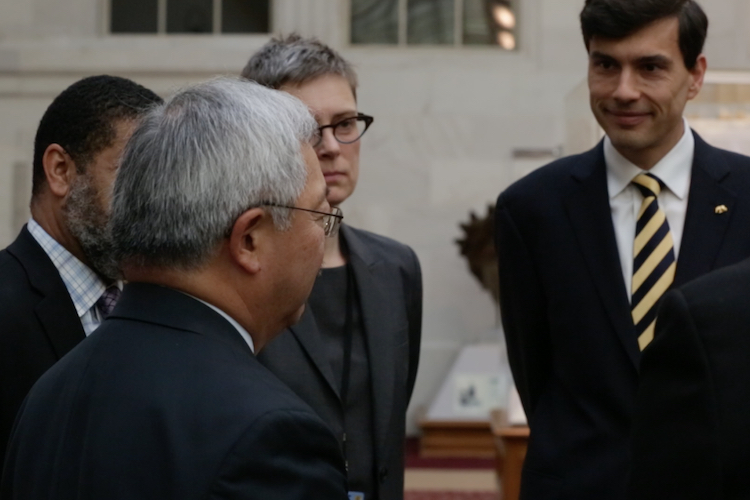UC Berkeley, city of San Francisco team up to tackle transit challenges
UC Berkeley teams up with city of San Francisco to become model for smart cities nationwide

May 4, 2016
Nearly 200 people gathered in San Francisco City Hall on May 3, vying for the attention of city and UC Berkeley transportation experts who hope to tap the local tech industry to turn San Francisco into a national model for “smart transportation.”
The city and UC Berkeley are partners in a national competition to land up to $40 million from the U.S. Department of Transportation to make San Francisco the first city to integrate technologies such as self-driving vehicles, smart sensors and “connected” vehicles into its transportation network. Vulcan Inc. is partnering with the transportation department and contributing another $10 million to the winning city.
Calling San Francisco the “innovation capital of the world,” Mayor Ed Lee said that the city, with its history of social equity and diverse public transit, is the right place to lead the way to a smart, more accessible, equitable, green and safe transportation network.
That means more shared mobility: not only cars, scooters and bikes, but shared rides and shuttles, all tied to public transit so that residents can go from doorstep to work or daycare with ease.
“We hope to transform surface streets, the way we travel and move goods around the city and hope to leave no one behind in this vision,” said Susan Shaheen, who is leading the UC Berkeley contingent for the competition. Shaheen, a pioneer in shared mobility, is co-director of the Transportation Sustainability Research Center in the Institute of Transportation Studies and an adjunct professor of civil and environmental engineering. “This is an opportunity for us to envision a quantum leap in transportation.”
San Francisco and the other cities competing for the Smart City Challenge grant – Austin, Texas; Columbus, Ohio; Denver, Colorado; Kansas City, Missouri; Pittsburgh, Pennsylvania; and Portland, Oregon – will present their final visions to U.S. Transportation Secretary Anthony Foxx in early June, providing a detailed roadmap on how they will integrate innovative technologies to create a prototype for the future of urban transportation.
“This is clearly very important for California, for the city and for the Bay Area, and a great way for the university to contribute to something that will have worldwide visibility – and I mean beyond the U.S. – and is completely aligned with the mission and service agenda we have at the university,” said Alex Bayen, director of UC Berkeley’s Institute of Transportation Studies and a professor of electrical engineering and computer sciences and of civil and environmental engineering.